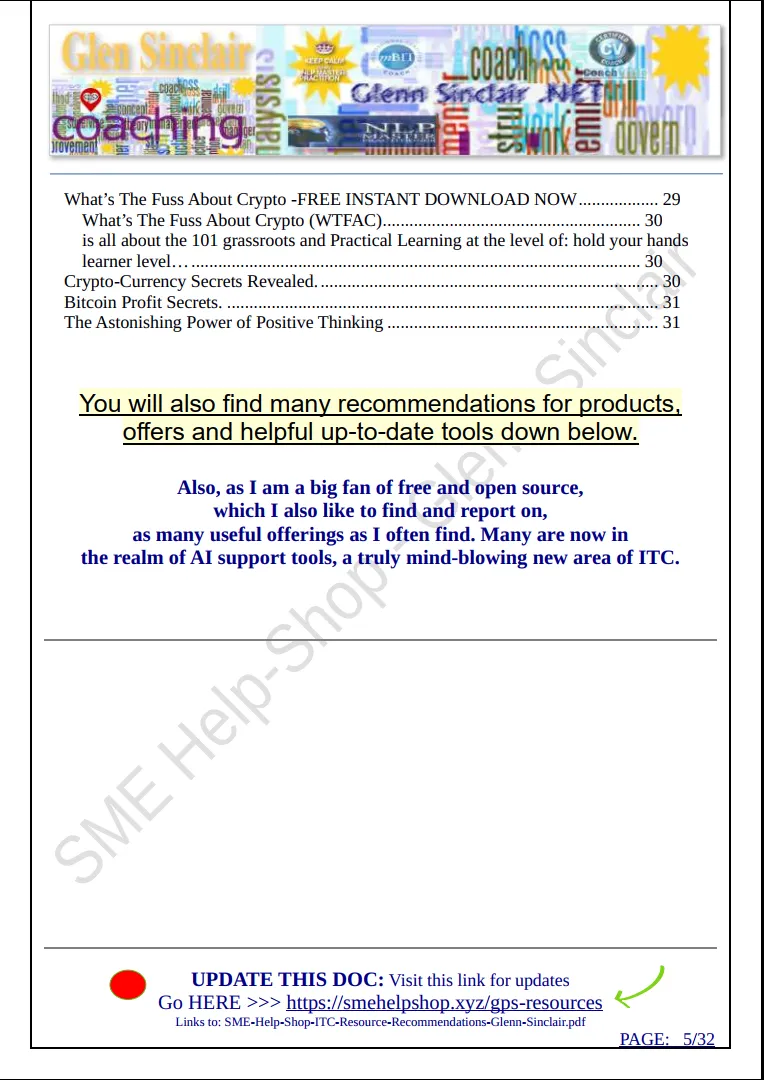AI is here to stay, so lets play big and hard, and use it to our advantages
Glen Sinclair .net
Greetings Earthling
Lets Make You an Awesome SME Business Person?
Perhaps A Joint Venture With SME Helpshop?
"Go confidently in the direction of your dreams, Live the life you have imagined" - Thoreau
"Any sufficiently advanced technology
is indistinguishable from MAGIC"
""to the uninformed"" (gps)
Arthur C. Clarke
Glenn is an SME that has three generations of experience:
Join with the MOST EFFICIENT
SME BUSINESS COACHING in this Galaxy. Lol

Systems Are the SME Lifeline
From my vantage point as a third-generation SME owner and Senior Systems Analyst, systems are far more than technology—they’re the backbone of a structured, thriving business.
Systems bring efficiency, data-driven clarity, scalability, and customer trust, all vital for consistent positive cash flow.
Across countless SME models and years of hands-on experience, I’ve seen systems transform chaos into stability, ensuring not just survival but sustainable growth.
For any SME aiming to secure a financial future, investing in systems isn’t optional—it’s essential.
Blog Musings
Why People Need Business Coaching?
People running SMEs, such as owners and managers, face unique challenges that make business coaching particularly valuable.
Here’s why SME people need business coaching:
- Strategic Planning: SMEs often deal with growth limitations, tough competition, and scarce resources. A business coach can help them develop a clear strategy and a practical roadmap to reach their goals.
- Leadership Development: Many SME leaders lack formal training in leadership. Coaching provides them with the tools and confidence to manage and motivate their teams effectively.
- Time Management: SME owners and managers frequently juggle multiple roles, which can lead to overwhelm. A coach can guide them in prioritizing tasks and making the most of their time.
- Financial Management: Unlike larger companies, SMEs often operate with tight budgets. Business coaching can teach them how to manage finances wisely to stay profitable and sustainable.
- Marketing and Sales: Without dedicated teams for marketing or sales, SMEs may struggle to grow their customer base. A coach can help them create affordable, effective strategies to attract and keep clients.
- Succession Planning: Many SMEs are family-run or have small leadership groups, making future transitions tricky. Coaching can assist in planning for leadership changes to ensure long-term success.
- Personal Development: Running an SME can be stressful and demanding. A coach can support leaders in managing stress, building resilience, and balancing work with personal life.
In short, business coaching offers SME people the tailored guidance, skills, and support they need to tackle the specific challenges of managing a smaller business, helping both the enterprise and its leaders thrive.
As a third-generation SME owner with exposure to numerous small and medium-sized enterprise (SME) models and decades of experience as a Senior Systems Analyst, I can confidently say that systems are the cornerstone of maintaining consistent positive cash flow.
SMEs face unique challenges—limited resources, tight budgets, and intense competition—but well-implemented systems provide the structure and tools needed to overcome these hurdles and ensure financial stability.
Here’s why systems are key, drawn from my extensive experience across family businesses and systems analysis.
---
### 1. Systems Drive Operational Efficiency
Efficiency is critical for SMEs, where every minute and dollar counts. Systems streamline processes, minimize errors, and eliminate wasteful steps. For example, an automated invoicing system ensures bills are sent promptly and followed up consistently, reducing the risk of late payments. This keeps cash flowing in as expected, directly supporting positive cash flow. In my family’s business and countless SMEs I’ve analyzed, I’ve seen how optimized processes turn chaotic operations into reliable cash-generating machines.
---
### 2. Systems Deliver Real-Time Data for Smart Decisions
Cash flow thrives on informed decision-making, and systems provide the accurate, real-time data needed to make it happen. Take inventory management: a good system prevents overstocking (which locks up cash) or stockouts (which cost sales). By aligning inventory with demand, cash flow stays steady. My years as a systems analyst have shown me that SMEs with data-driven insights avoid costly missteps, keeping their finances on track.
---
### 3. Systems Enable Scalable Growth
Growth is the goal for any SME, but it can strain cash flow if costs rise disproportionately. Systems allow you to scale efficiently—handling more volume without a matching increase in expenses. For instance, an order processing system can manage a surge in sales without requiring extra staff, boosting profit margins and cash flow. Across generations in my family’s SME and various models I’ve studied, scalable systems have been the difference between growth that thrives and growth that falters.
---
### 4. Systems Reduce Reliance on Individuals
SMEs often depend heavily on key people, but this can jeopardize cash flow if someone leaves or is unavailable. Systems mitigate that risk by standardizing processes. For example, documented accounts receivable procedures ensure cash collection continues smoothly regardless of who’s in charge. My experience has taught me that systematizing operations creates resilience, protecting cash flow from human disruptions.
---
### 5. Systems Boost Customer Satisfaction and Retention
Happy customers are the lifeblood of cash flow—they pay on time, return, and refer others. Systems like a Customer Relationship Management (CRM) tool ensure timely, personalized follow-ups, fostering loyalty and repeat business. In our family SME and the models I’ve encountered, consistent service delivery through systems has turned customers into reliable revenue streams, reinforcing cash flow stability.
---
### 6. Systems Ensure Compliance and Protect Cash Reserves
Regulatory slip-ups can lead to fines or penalties that drain cash. Systems help SMEs stay compliant—think of an accounting system that accurately calculates and files taxes on time. Over decades, I’ve seen how compliance-focused systems safeguard cash flow by preventing unexpected financial hits, a lesson reinforced in both my family business and client engagements.
---
### 7. Systems Strengthen Financial Management
Positive cash flow demands proactive financial oversight, and systems provide the tools for budgeting, forecasting, and expense tracking. A cash flow forecasting system, for instance, helps anticipate and address shortfalls before they become crises. My background in systems analysis and SME operations has proven that these tools empower owners to cut waste and invest wisely, keeping cash flow healthy.
---
### 8. Systems Automate Routine Tasks
Automation frees up time for revenue-generating activities. For example, automating email marketing or social media posts maintains your brand presence without constant effort, allowing focus on sales strategies. In my career and family business, I’ve witnessed automation shift resources toward growth, amplifying cash flow without adding overhead.
---
### 9. Systems Enhance Communication
Delays from miscommunication—whether internal or with suppliers and clients—can disrupt cash flow. A project management system keeps everyone aligned, ensuring projects and payments stay on schedule. My exposure to diverse SME models highlights how smooth information flow, enabled by systems, prevents costly hiccups.
---
### 10. Systems Support Continuous Improvement
Markets evolve, and SMEs must adapt. Systems offer a framework to monitor performance, spot inefficiencies, and optimize processes. A quality management system, for instance, can reduce waste and boost profitability over time. Decades of refining systems in my family’s SME and beyond have shown me that this ongoing improvement sustains and enhances cash flow.
---
### Conclusion: Systems Are the SME Lifeline
From my vantage point as a third-generation SME owner and Senior Systems Analyst, systems are far more than technology—they’re the backbone of a structured, thriving business.
Systems bring efficiency, data-driven clarity, scalability, and customer trust, all vital for consistent positive cash flow. Across countless SME models and years of hands-on experience, I’ve seen systems transform chaos into stability, ensuring not just survival but sustainable growth.
For any SME aiming to secure its financial future, investing in systems isn’t optional—it’s essential.
Defining an SME
Small and Medium-sized Enterprises (SMEs) are businesses typically defined by a limited number of employees (or turnover)—often fewer than 200 employees in places like Australia.
Why AM I So Radical and DIVERGENT?
As an SME business coach, divergence being our unique approach, perspective, or methods—likely stems from a combination of personal traits, experiences, and professional choices that set you apart from others in your field.
Here’s a breakdown of why you might be so divergent as an SME coach, based on common factors that contribute to a distinctive coaching style:
1. Unique Background and Expertise: Your past experiences—whether in specific industries, roles, or even personal challenges—shape your coaching approach. For example, if you’ve run an SME yourself, faced significant failures, or worked in a niche sector, you bring insights others might not have. This allows you to connect with clients in ways that generic coaching frameworks can’t.
2. Personalized Coaching Style: You may prioritize tailoring your methods to each client’s specific needs rather than using a one-size-fits-all model. This could involve blending unconventional tools—like creative problem-solving, mindfulness techniques, or industry-specific tactics—making your coaching stand out.
3. Innovative Problem-Solving: Divergent thinkers often approach challenges creatively. As an SME coach, you might use non-traditional strategies, such as leveraging technology, encouraging bold pivots, or integrating cross-industry ideas, to help clients overcome obstacles in ways other coaches might not consider.
4. Focus on Holistic Growth: Many SME coaches focus solely on business metrics like revenue or operations. If you emphasize the personal growth of the business owner—addressing their mindset, emotional resilience, or work-life balance—you’re diverging from the norm by treating the person and the business as interconnected.
5. Deep Empathy and Connection: Your ability to deeply understand and empathize with the unique struggles of SME owners (e.g., limited resources, high stress, or wearing multiple hats) might make your coaching more relational and impactful. This emotional intelligence sets you apart in a field where technical advice often dominates.
6. Adaptability to SME Challenges: SMEs face distinct pressures—tight budgets, fierce competition, or lack of specialized staff. If you’ve developed creative, resource-efficient strategies to address these, your divergence could come from your ability to think like an SME owner and offer practical, actionable solutions.
7. Visionary or Unorthodox Methods: You might incorporate forward-thinking or unconventional tools, such as AI-driven insights, gamification, or storytelling, to engage clients. This willingness to experiment and push boundaries makes your coaching approach stand out.
8. Passion for Disruption: If you naturally challenge the status quo—whether in business practices, industry norms, or even coaching itself—your divergence could stem from a drive to innovate and inspire SME owners to think differently about their businesses.
### Reflecting on Your Divergence as an SME
To pinpoint exactly why you are divergent, consider:
- Your Unique Value Proposition: What do you offer that other coaches don’t? Is it your process, philosophy, or results?
- Client Feedback: What do clients say about your approach? Do they highlight your creativity, empathy, or unconventional strategies?
- Your Influences: Are you drawing from diverse fields (e.g., psychology, tech, or art) that shape your coaching in unexpected ways?
- Your Personality: Are you naturally curious, rebellious, or visionary, leading you to challenge traditional coaching norms?
No blogs found
SPEAKING EVENTS
Recommendations and Next Steps
Glenn Philip Sinclair can help narrow down your Stage Presentation.
General Advice for TEDx
Preparation: If you’re seeking guidance on preparing for TEDx or similar events, focus on:
Crafting your Story: Develop a clear, personal story tied to a universal theme, as seen in successful TEDx talks (e.g., Amy Cuddy’s power posing talk).
Coaching: Work with a coach like Glenn Sinclair, who emphasizes authenticity and vocal delivery, or use resources like TED Masterclass.
Practice: Rehearse extensively to refine timing and emotional impact, as advised by experts like Helen Packham.
Further: Glenn Sinclair, can analyze Your specific contributions, that is Your Story, as applied to a speaking events or training.
RESEARCH: Just look at Glenn Sinclair as the Founder of nTEDx at Confest for Years 2017-19
So Lets focus on TEDx preparation strategies, with Glenn Sinclair’s speaking and crowd engagement skills.

BUSINESS BOOKS
My Book Collection on Amazon and Lean Pub are coming to this page ASAP

COACHING CLASSES
Coaching Classes for SME's
Coaching classes for SME (small and medium enterprise) founders typically focus on equipping entrepreneurs with skills to grow their businesses, enhance leadership, and communicate effectively.
These classes are often offered by organizations like the SME Founders Association (SFA), and global coaching bodies like the International Coaching Federation (ICF).
Below, I’ll outline the types of coaching classes relevant to SME founders, emphasizing public speaking and stage presentation skills, and connect you to nTEDx-style training.

FOUNDLINGS
To prepare for TEDx, founders need to craft a clear, unique idea (e.g., “persistence in entrepreneurship” or “innovating in resource-scarce markets”) and deliver it in an engaging 18-minute format.
Coaches like Glenn Sinclair emphasize authenticity and vocal clarity, which are critical for TEDx success, particularly you will be utilizing and incorporating the magic of N.L.P. as an efficient communications technology.
BUSINESS COACHING CLASSES

Startup Coaching

Business Philosophy

Seminars

1 on 1 Coaching

Books & Videos











